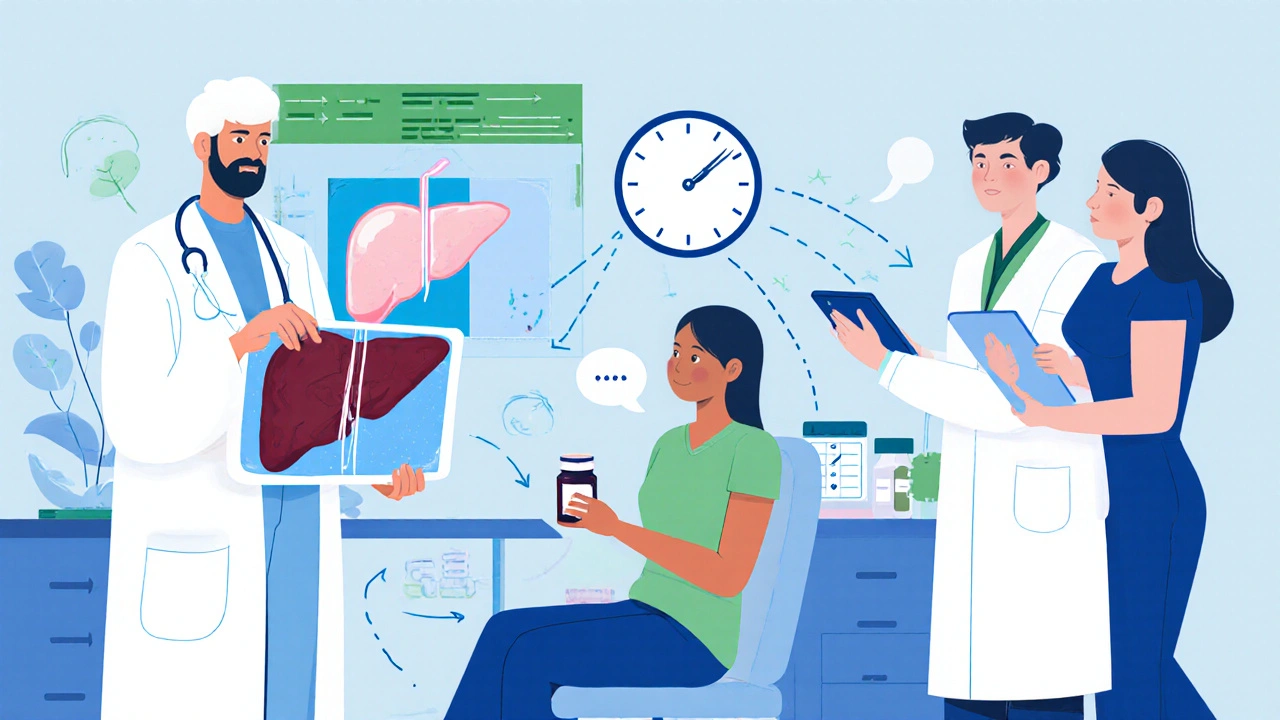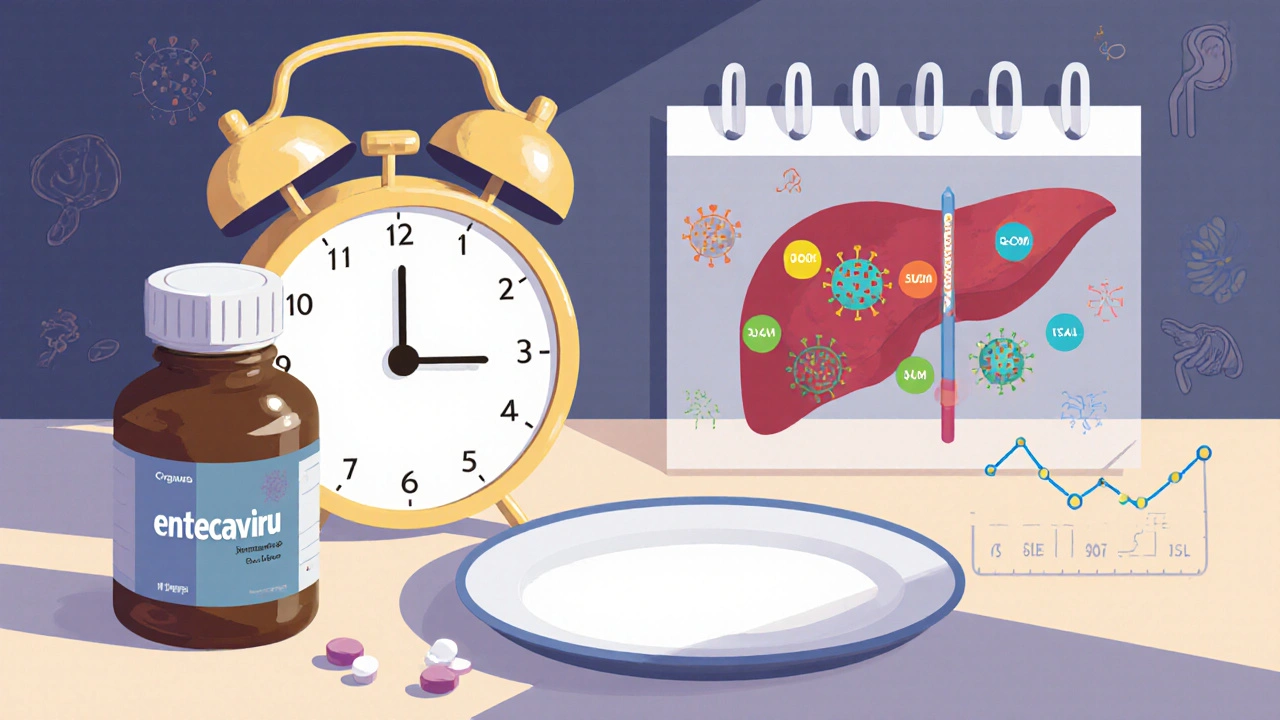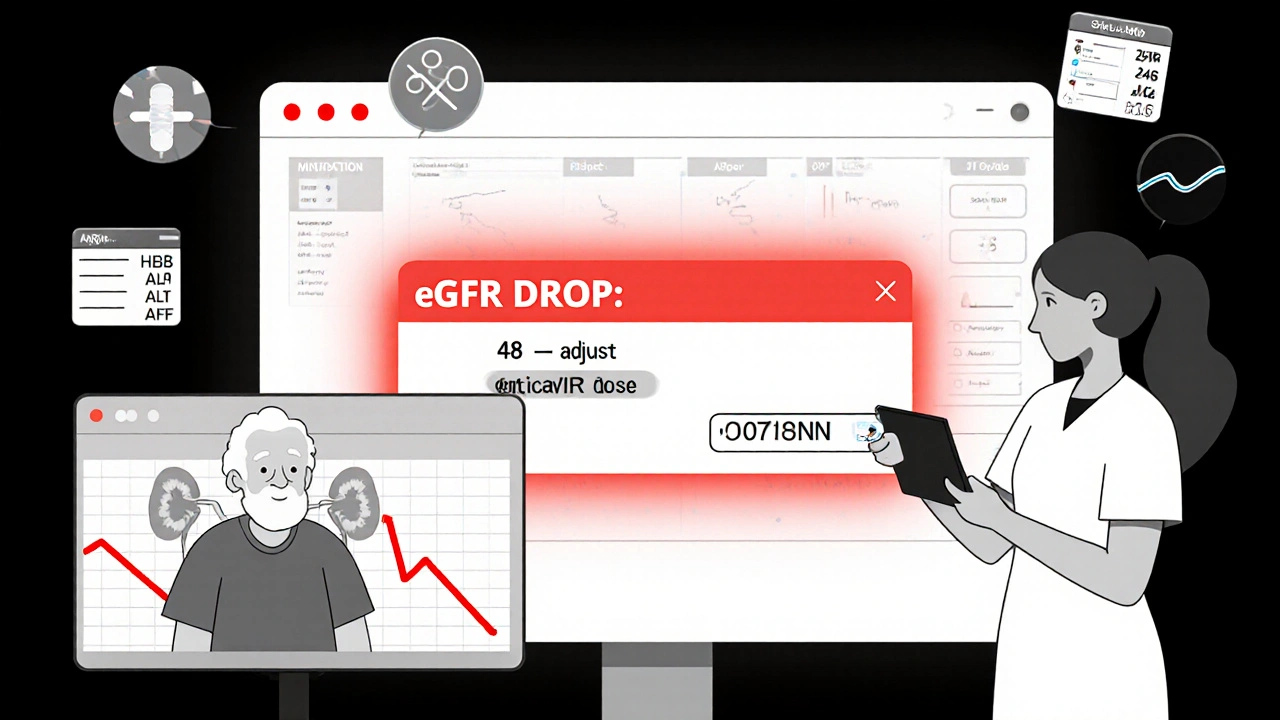Entecavir and Healthcare Professionals: How Teams Work Together for Effective Hepatitis B Treatment
 Oct, 28 2025
Oct, 28 2025
When someone is diagnosed with chronic hepatitis B, the road to recovery isn’t just about taking a pill. It’s about a team - doctors, nurses, pharmacists, and patients - all working in sync. Entecavir is one of the most trusted antiviral drugs for this condition, but it doesn’t work in a vacuum. Its real power comes from how healthcare professionals use it, monitor it, and support patients through the long haul.
What Entecavir Actually Does
Entecavir is a nucleoside analog that blocks the hepatitis B virus from copying itself inside liver cells. It doesn’t cure the infection, but it stops the virus from multiplying so fast that it damages the liver. In clinical trials, over 90% of patients with detectable viral load saw their HBV DNA drop below detectable levels within a year of starting entecavir. That’s not magic - it’s science.
Unlike older drugs like lamivudine, entecavir has a very low chance of causing drug resistance. For patients who’ve never been treated before, resistance rates are under 1.2% after five years. That’s why guidelines from the American Association for the Study of Liver Diseases (AASLD) and the World Health Organization (WHO) list entecavir as a first-line treatment.
Why One Doctor Isn’t Enough
Managing hepatitis B isn’t a one-person job. A patient might see a hepatologist for liver scans, a primary care provider for blood pressure and diabetes checks, a pharmacist to sort out drug interactions, and a nurse educator to explain how to take the pill every day. Each role matters.
Take the pharmacist, for example. Entecavir must be taken on an empty stomach - at least two hours before or after food. Many patients don’t know this. A pharmacist catching that mistake can prevent treatment failure. One study from the University of California found that patients who got counseling from a clinical pharmacist were 40% more likely to stay on their regimen for over a year.
Nurses often track lab results between visits. If a patient’s ALT levels start rising again after months of stability, that’s a red flag. It could mean the virus is coming back, or the kidneys are struggling - entecavir is cleared through the kidneys, so dosage needs adjusting in older adults or those with kidney disease.
The Patient’s Role Isn’t Passive
Too often, patients are told to take a pill and come back in six months. That’s not care - it’s neglect. Effective entecavir treatment requires ongoing dialogue. Patients need to know:
- Why skipping doses matters - even one missed day can let the virus rebound
- That they still need liver cancer screenings, even if the virus is suppressed
- That alcohol and certain herbal supplements can wreck their liver, even if entecavir is working
One nurse in a community clinic in North Carolina started using simple visual charts - a calendar with colored stickers for taken pills, and a liver diagram showing how the virus attacks. Patients who used these tools were twice as likely to report perfect adherence after six months.

When Things Go Off Track
Not everyone responds the same way. Some patients see viral load drop in weeks. Others take months. If after six months the virus is still detectable, the team needs to act - not just switch drugs, but ask why.
Is the patient taking it correctly? Are they using generic versions from unreliable sources? Are they taking antacids or iron supplements that block entecavir absorption? These are all things a coordinated team can uncover.
And then there’s cost. Entecavir isn’t cheap. In the U.S., a 30-day supply can run $300-$600 without insurance. That’s why social workers and patient advocates are now part of the team. They help connect people to manufacturer assistance programs, Medicaid, or nonprofit aid. One 2024 audit of 500 patients found that those with access to financial counseling were 70% less likely to stop treatment due to cost.
Monitoring Isn’t Optional - It’s the Core
Entecavir isn’t a “set it and forget it” drug. Regular blood tests are non-negotiable. Here’s what the team watches:
- HBV DNA levels - every 3-6 months to confirm suppression
- ALT and AST - liver enzyme levels that show inflammation
- Renal function - creatinine and eGFR, especially in patients over 60
- Hepatitis B surface antigen (HBsAg) - to track long-term progress
- Liver ultrasound and AFP - every 6-12 months for liver cancer screening
One clinic in Atlanta started using automated alerts in their EHR system. If a patient’s eGFR dropped below 50, the system flagged it and pushed a reminder to the provider to adjust the dose. Within a year, hospitalizations due to kidney toxicity dropped by 65%.
What Happens After Years of Treatment?
Many patients stay on entecavir for life. That’s not a failure - it’s success. The goal isn’t to eliminate the virus completely (which is rare), but to keep it quiet enough that the liver stays healthy.
Some patients wonder if they can stop. The answer? Almost always no. Stopping entecavir without medical supervision can trigger a dangerous flare - sometimes leading to liver failure. In one 2023 study, 30% of patients who quit on their own had severe rebound hepatitis within three months.
That’s why the team’s job doesn’t end when the virus is suppressed. It’s about building trust so patients understand: staying on the drug isn’t a punishment. It’s the price of a normal life - no cirrhosis, no transplant, no early death.

Real Teams, Real Results
At the University of Michigan Liver Center, they formed a dedicated hepatitis B care team in 2022. It included a hepatologist, a pharmacist, a nurse navigator, a social worker, and a mental health counselor. Patients weren’t just seen - they were followed. Within two years, adherence jumped from 68% to 94%. Viral suppression rates went from 72% to 91%. Hospital visits for liver complications dropped by half.
It wasn’t because they found a better drug. It was because they stopped treating entecavir like a prescription and started treating it like a partnership.
What You Can Do as a Patient
If you’re on entecavir, here’s what works:
- Take it at the same time every day - set a phone alarm
- Keep a log of doses and side effects - bring it to every appointment
- Ask your pharmacist: "Can anything I’m taking interfere with this?"
- Don’t start herbal supplements without checking - milk thistle, kava, and others can harm your liver
- Know your numbers - ask for your latest HBV DNA and eGFR results
And if you feel like your care team isn’t listening - find one that does. Hepatitis B is manageable. But only if everyone shows up.
Can entecavir cure hepatitis B?
No, entecavir doesn’t cure hepatitis B. It suppresses the virus to very low levels, which prevents liver damage and reduces the risk of cirrhosis and liver cancer. In rare cases, patients may lose the hepatitis B surface antigen (HBsAg) after years of treatment, which is considered a functional cure - but this happens in less than 5% of cases. Most people need to stay on entecavir long-term.
How long does it take for entecavir to work?
Most patients see a drop in viral load within 4 to 8 weeks. By 6 months, over 90% of treatment-naïve patients have undetectable levels of HBV DNA. But it can take longer in people with high initial viral loads or advanced liver disease. The key is consistency - skipping doses delays results and raises resistance risk.
Can I take entecavir with other medications?
Entecavir can interact with some drugs. Antacids, iron supplements, and calcium supplements can reduce its absorption if taken at the same time. Always take entecavir on an empty stomach - at least two hours before or after food or other meds. Always tell your pharmacist and doctor about everything you’re taking, including over-the-counter pills and herbal products.
What are the side effects of entecavir?
Most people tolerate entecavir well. Common side effects include headache, fatigue, dizziness, and nausea - usually mild and temporary. Rare but serious risks include lactic acidosis and severe liver worsening after stopping the drug. Kidney problems can also occur, especially in older adults or those with pre-existing kidney disease. Regular blood tests catch these early.
Why do I still need liver cancer screenings if my virus is suppressed?
Even when entecavir fully suppresses the virus, the risk of liver cancer doesn’t disappear - especially if you already have cirrhosis or were infected for many years. The virus can leave behind genetic changes in liver cells that may lead to cancer over time. That’s why ultrasound and AFP blood tests every 6-12 months are critical, even if you feel fine.
Is generic entecavir safe?
Yes, generic entecavir is safe and effective if it’s approved by the FDA or WHO. Many generic versions are bioequivalent to the brand-name drug. But avoid buying from unverified online pharmacies - counterfeit or substandard versions exist. Always get your medication from a licensed pharmacy, and ask your pharmacist to confirm the manufacturer.
Next Steps for Patients and Providers
If you’re a patient: Don’t wait for your next appointment to speak up. Call your provider if you miss a dose, feel unusually tired, or notice yellowing skin. Bring your pill log. Ask for your latest lab numbers.
If you’re a provider: Build a care protocol. Use EHR alerts for kidney function. Partner with pharmacists to counsel on timing. Connect patients to financial aid. Track adherence like you track viral load.
Entecavir works. But only when the whole team shows up - and stays.
Susan Karabin
October 28, 2025 AT 18:32Entecavir isn’t magic but it’s the closest thing we’ve got to a peace treaty with the virus
It’s not about eradication it’s about coexistence
My uncle’s been on it for 12 years no cirrhosis no transplant just a quiet life
That’s the win
Shilah Lala
October 28, 2025 AT 20:01So we’re paying $600 a month for a drug that doesn’t even cure anything?
Meanwhile in India people get generic for $5 and live just fine
Capitalism is the real virus here
Tanuja Santhanakrishnan
October 29, 2025 AT 14:02I work in a rural clinic in Kerala and we’ve seen this exact model work wonders
Pharmacist gives daily reminders via WhatsApp nurse tracks labs every 3 months
Patients feel seen not just dosed
Cost? We use WHO-approved generics and patient groups help with transport
Teamwork isn’t fancy it’s just consistent
Cecil Mays
October 29, 2025 AT 20:37THIS. This is the kind of post that makes me believe in healthcare again 🙌
It’s not about the pill it’s about the person behind it
And yes the pharmacist catching that empty stomach thing? That’s the hero we don’t talk about
Also if you’re on entecavir and not tracking your eGFR you’re playing Russian roulette with your kidneys 💉
Billy Gambino
October 30, 2025 AT 07:30The clinical paradigm is fundamentally flawed if we treat virologic suppression as therapeutic success
HBV integration into the host genome persists regardless of DNA load
True cure requires immune reconstitution and epigenetic modulation
Entecavir merely suppresses reverse transcription without addressing viral reservoirs
We’re managing symptoms not eradicating pathology
And yet we call this medicine
Jen Taylor
November 1, 2025 AT 06:43My sister started entecavir after her ALT hit 180
She was terrified she’d die before 40
Then her nurse gave her a sticker calendar and said "every day you take it you’re painting your liver a new color"
Now she’s got a rainbow on her fridge and her HBV DNA is undetectable
It’s not the drug it’s the way we make people feel like they’re winning
Glenda Walsh
November 1, 2025 AT 07:26Wait so you’re saying if I miss a dose the virus comes back? Like immediately?
What if I’m traveling and forget my pills?
What if I’m drunk?
What if I’m just tired?
Is my liver gonna explode?
Can I just take two the next day?
Why doesn’t anyone just tell me the truth?
Why is this so complicated?
Why do I feel like I’m failing just by being human?
Lorena Cabal Lopez
November 1, 2025 AT 09:5094% adherence? In the US?
That’s a fantasy
My cousin was on it for six months then stopped because she couldn’t afford the copay
Now she’s in the ER with liver failure
And no one in her care team ever asked about money
They just kept prescribing
Raj Modi
November 2, 2025 AT 21:17It is imperative to underscore that the multidisciplinary approach delineated herein represents a paradigmatic shift from the traditional biomedical model to a holistic bio-psycho-social framework
Pharmacists serve as critical gatekeepers of therapeutic adherence
Nurses function as longitudinal coordinators of clinical surveillance
And social workers mitigate structural determinants of non-adherence
When these elements are synergistically integrated the therapeutic outcome transcends mere virologic suppression and achieves true patient empowerment
One must acknowledge that the efficacy of entecavir is not intrinsic but emergent from the integrity of the care ecosystem
Sarah Schmidt
November 4, 2025 AT 02:24They say entecavir is safe but what about the people who get lactic acidosis?
What about the ones who stop because they’re scared of kidney damage?
What about the ones who feel like their entire identity is now "HBV patient"?
We celebrate adherence like it’s a virtue but we never talk about the weight of that daily choice
Is it hope or is it fear that keeps people taking it?
And if it’s fear… is that really care?
Emil Tompkins
November 5, 2025 AT 16:52Entecavir is a scam
Big Pharma made it so expensive because they know you’ll pay anything to not die
And now they’ve convinced doctors that you need a whole team just to take a pill
Meanwhile the real solution is sunlight vitamin D and not drinking alcohol
But that doesn’t sell
So they sell $600 pills and fancy EHR alerts
It’s all theater
Stuart Palley
November 5, 2025 AT 17:39I’ve seen patients on entecavir for years and they’re fine
But I’ve also seen the ones who stopped because they thought "I feel fine so I don’t need it"
And then boom - liver crash in three months
It’s not paranoia it’s physics
The virus doesn’t care how you feel
It just waits
STEVEN SHELLEY
November 6, 2025 AT 09:41ENTECAVIR IS A GOVERNMENT CONTROL TOOL
THEY DON’T WANT YOU CURED BECAUSE THEN YOU’D STOP PAYING FOR THE DRUG
THEY’RE KEEPING YOU DEPENDENT
THEY’RE USING HBV TO TEST MICROCHIP IMPLANTS IN THE PILLS
YOUR KIDNEYS AREN’T FAILING - THEY’RE BEING HACKED
LOOK AT THE PATENT DATES - THEY MATCH THE CDC’S SURVEILLANCE PROGRAM
ASK YOUR PHARMACIST WHERE THE INGREDIENTS REALLY COME FROM
THEY’LL LIE TO YOU
Christy Tomerlin
November 7, 2025 AT 23:15So let me get this straight
Doctors are heroes
Pharmacists are heroes
Nurses are heroes
But the patient who misses a dose because they’re depressed or broke or tired?
They’re the problem
That’s not teamwork
That’s blame wrapped in a white coat
Kevin Stone
November 9, 2025 AT 01:06Interesting perspective
But I wonder if the focus on adherence overlooks the psychological burden of lifelong treatment
And whether the medical community is truly equipped to address the existential fatigue that comes with chronic illness
It’s easy to optimize protocols
Harder to sit with someone who’s tired of fighting a ghost